Physical Address
304 North Cardinal St.
Dorchester Center, MA 02124
Physical Address
304 North Cardinal St.
Dorchester Center, MA 02124
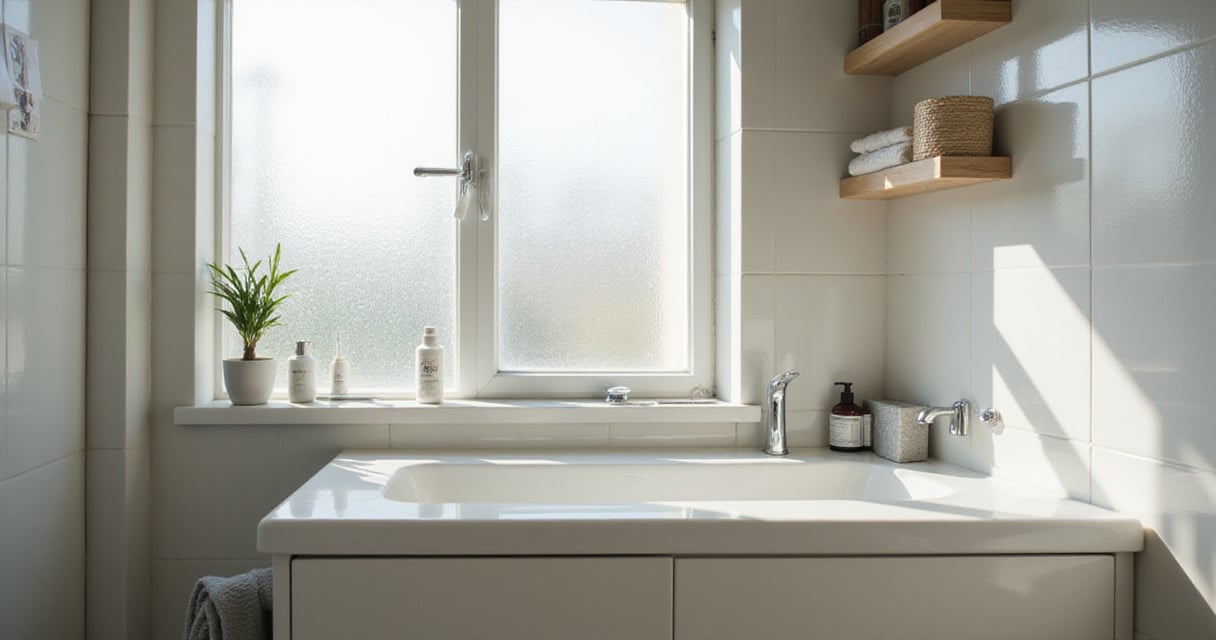
Discover 20 genius bathroom design small space hacks that maximize style and functionality. Transform your tiny washroom into a spacious sanctuary today!
That first step into a five-star hotel suite bathroom—it’s a feeling, isn’t it? The air seems different. There’s a quiet sense of order, a feeling of expansive calm, even if the room itself isn’t a ballroom. For over a decade, my work has centered on bottling that exact feeling and bringing it into the home. But clients often tell me, “Alexandra, my bathroom is a shoebox. A gut renovation isn’t in the cards.” I always smile, because the secret to luxury isn’t about knocking down walls. It’s about perception, precision, and a few well-kept hospitality secrets.
A cramped, cluttered bathroom is more than an aesthetic challenge; it robs your home of a potential sanctuary. The good news? Transforming it is an exercise in intelligence, not brute force. You don’t need more square footage. You need a more sophisticated plan. We’re going to move beyond the obvious and into the world of strategic design, manipulating light and creating efficiencies that will make your compact washroom feel grand, intentional, and remarkably serene. This is where we stop thinking about limitations and start seeing potential.
Before a single tile is chosen or a faucet is ordered, the most profound change you can make is to edit. I don’t like the word “declutter”; it sounds like a chore. This is about curation. In hotel design, we obsess over what isn’t there. The countertops are clear, the surfaces are clean. This creates an immediate sense of calm and luxury. Your home deserves that same respect.
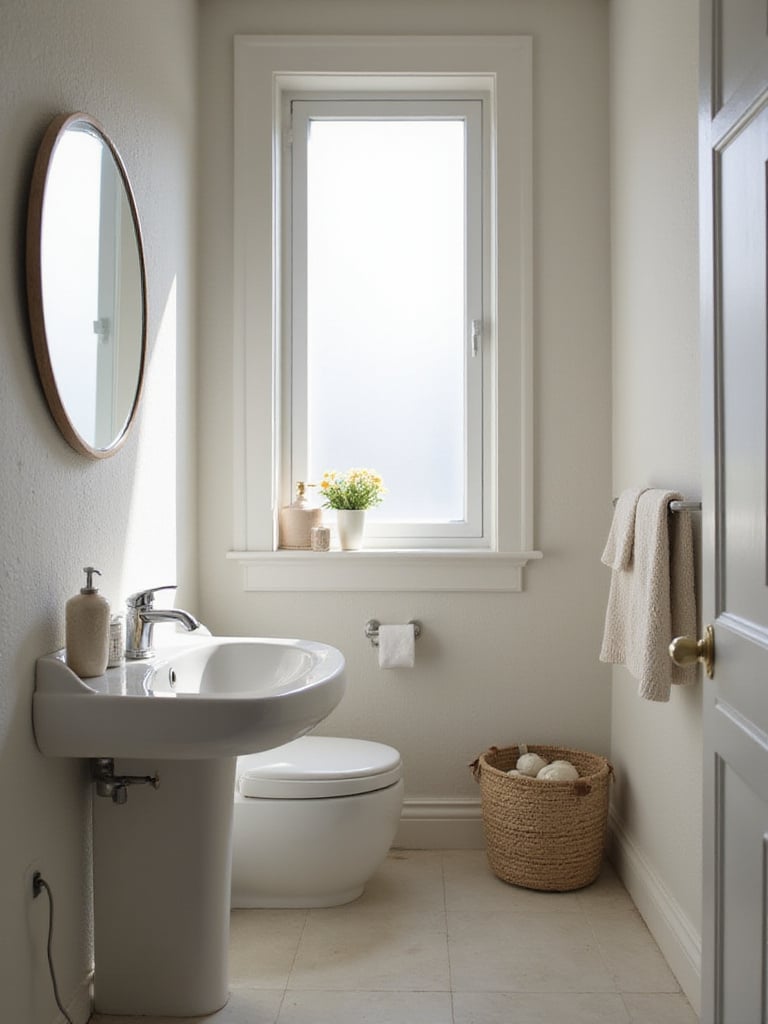
This process is about creating a visual and mental deep breath. To begin, you must be unsentimental. Take everything—and I mean everything—out of the cabinets, off the counters, and out of the shower. Lay it all on a towel on your floor. The sheer volume is often the only motivation needed. I once worked with a client in a historic Boston brownstone whose powder room felt impossibly tight. By simply removing expired products and duplicate toiletries, we freed nearly an entire under-sink cabinet and reduced the items on her petite vanity from twelve to two. The room didn’t get bigger, but it suddenly felt like it could breathe. The change was instant and, frankly, astonishing.
Once you have a clean canvas, we can address the room’s bones. In the design world, we often talk about the “wet wall”—a single wall that houses all the plumbing for the sink, toilet, and shower. Arranging your three core fixtures (the toilet, sink, and shower) along this one wall is the cornerstone of efficient Small Bathroom Design. It’s not just about streamlining plumbing and saving on construction costs, though that’s a handsome benefit. It’s about maximizing your open, walkable floor space
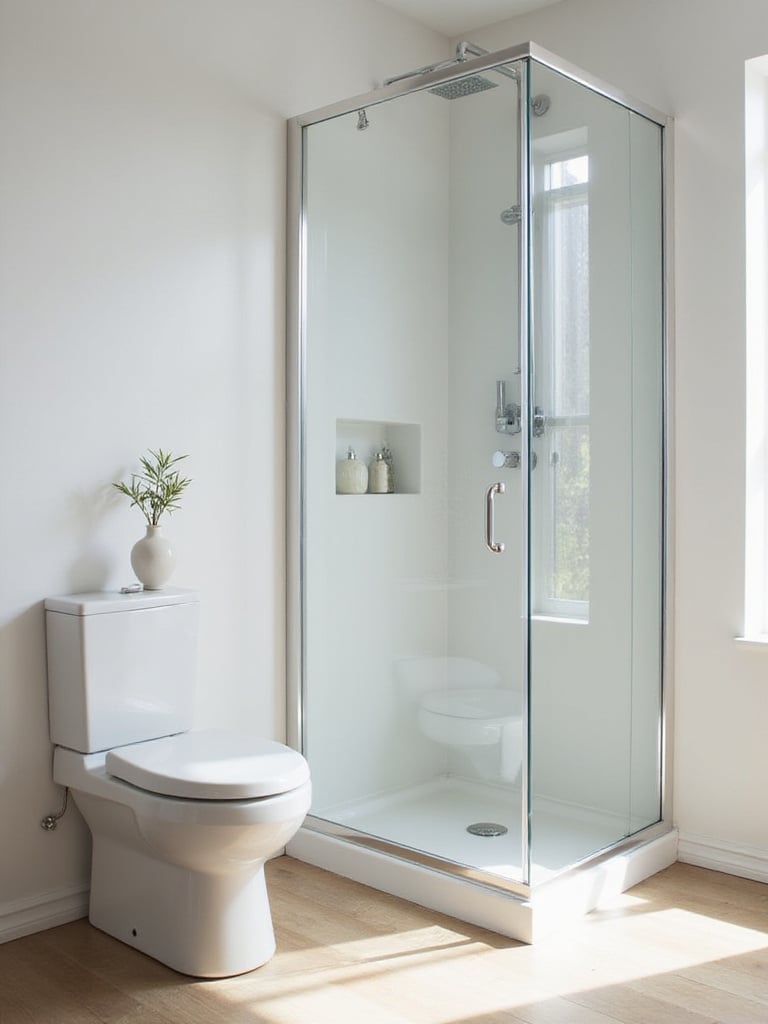
By lining up the essentials, you create a clear, unobstructed path, which instantly makes the room feel more navigable and far less claustrophobic. It’s a foundational principle we use in hotels to ensure a guest’s movement is fluid and intuitive. You’re not trying to cram in a dozen features; you’re making the three most important ones work in perfect harmony. Start by locating your main plumbing stack—that’s your anchor—and design from there.
Now, let’s talk about the single biggest space thief in any small room: the traditional swing door. It greedily claims up to nine square feet of floor space that could be used for, well, anything else. Replacing it is one of the most impactful changes you can make.
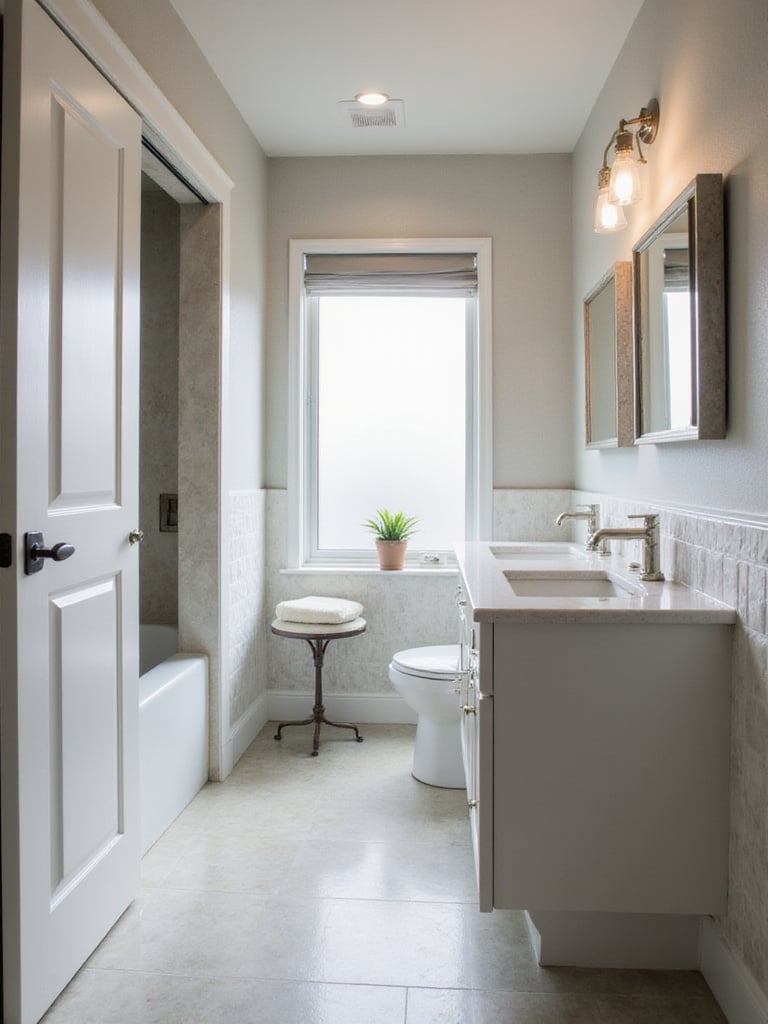
A pocket door, which slides discreetly into the wall cavity, is the most elegant solution. It simply vanishes, freeing up an entire corner of your bathroom. The smooth, satisfying glide of a high-quality pocket door from a maker like Johnson Hardware feels incredibly luxe. If your wall structure won’t allow for a pocket door (perhaps due to plumbing or wiring), a surface-mounted barn door is an excellent, and often statement-making, alternative. By eliminating that door’s swing, you might suddenly have room for that larger vanity or slim storage cabinet you thought was impossible.
You wouldn’t wear a shoe that’s three sizes too big, yet I often see enormous fixtures overwhelming a small bathroom. Proportionality is elegance. Opting for fixtures specifically designed for compact spaces isn’t about compromise; it’s about sophisticated scaling.
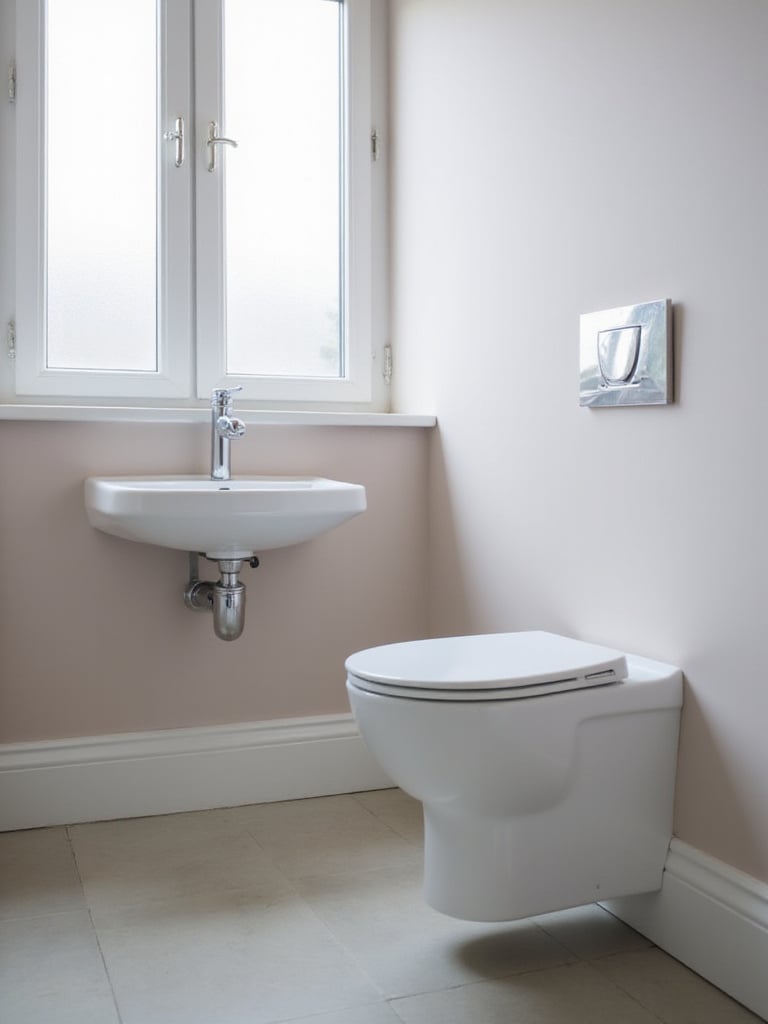
Look for “short-projection” toilets that sit closer to the wall, saving you several precious inches of depth. Brands like TOTO and Duravit have perfected the art of the compact, yet comfortable, fixture. The same goes for the sink. A pedestal sink can be lovely, but its footprint can be clunky. Consider a slim console sink or a wall-mounted basin instead. These choices give back critical inches of floor space, widening pathways and making the entire room feel more generous.
In the geometry of a small bathroom, the corner is often dead space. A design dead end. But what if it could become the focal point? A corner sink is an incredibly clever move that reclaims this underused real estate, freeing up the main wall and creating a more dynamic, less predictable layout.
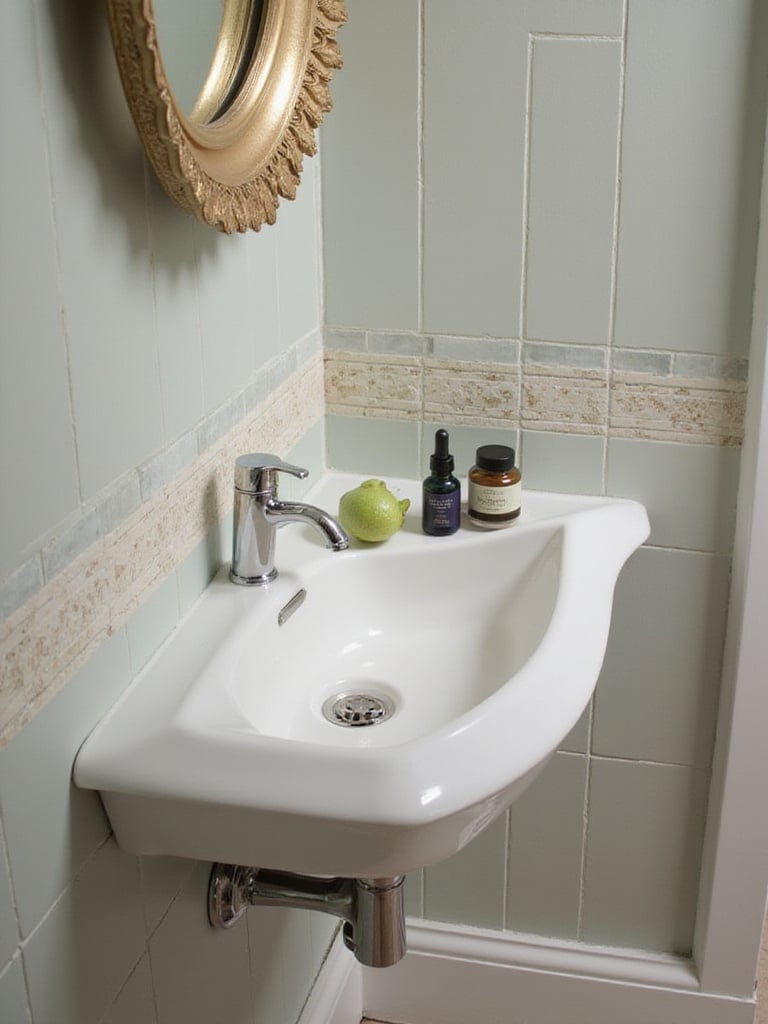
By tucking the sink neatly into a corner, you open up the center of the room, dramatically improving traffic flow. Imagine being able to stand at the vanity without feeling wedged between the toilet and the shower door. This simple shift can make it possible to install a more spacious shower or create more comfortable clearance around the toilet. It’s about thinking diagonally and breaking out of the boxy, linear layout that can make small rooms feel so rigid.
If there is one signature move that instantly signals “luxury hotel,” it is the Floating Vanity. Mounting your vanity to the wall and leaving the floor beneath it completely clear is a game-changer. Why? It creates what designers call negative space. Your eye follows the line of the flooring all the way to the back wall, which tricks your brain into perceiving the room as deeper and larger than it is.
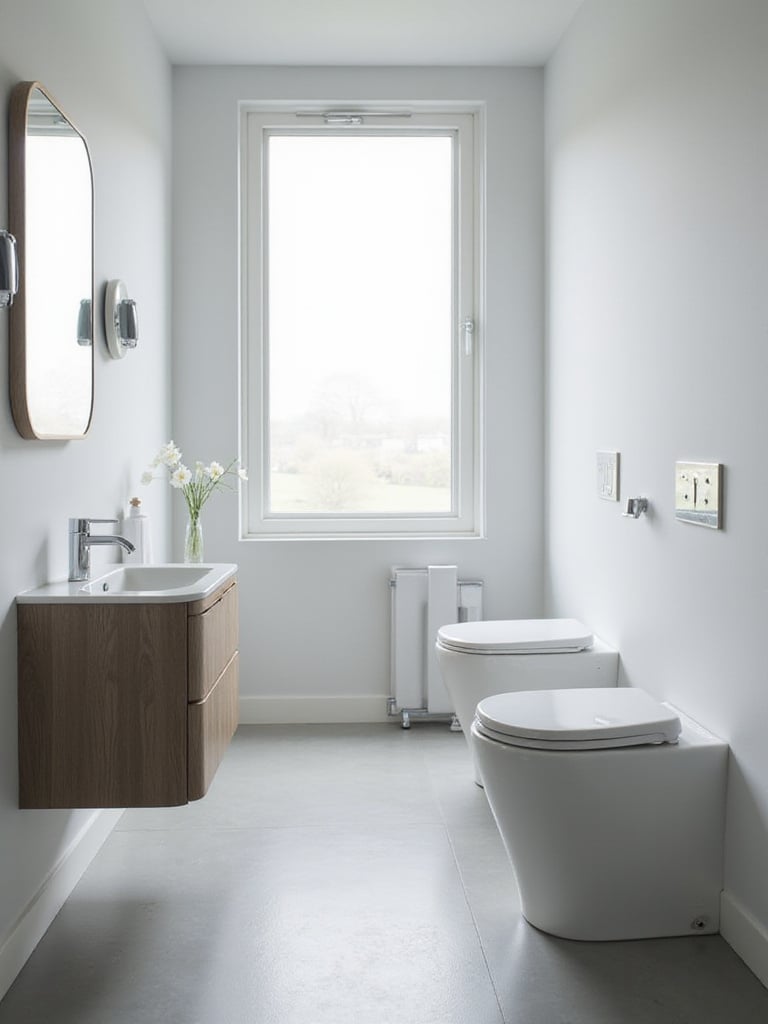
The effect is immediate and powerful. You’re not just gaining visible square footage; you’re creating an airy, weightless feeling. I always tell my clients, “Lifting fixtures off the floor does for a room what lifting your chin does for your posture.” It adds confidence and grace. And the practical benefit? Cleaning becomes a breeze. No more awkward crouching to get around a dusty cabinet base.
Insider Tip: To truly elevate the effect, integrate a motion-activated LED strip light underneath the floating vanity. It casts a soft, ethereal glow, enhancing the illusion of weightlessness and doubling as a sophisticated, automatic nightlight.
Just like the main entry door, a swinging shower door can create a frustrating bottleneck. In a tight space, it might bump into the toilet or prevent the vanity drawers from opening fully. A sliding shower door, or bypass door, is the obvious solution. It operates on a track, eliminating the need for any swing clearance and instantly reclaiming valuable functional space.
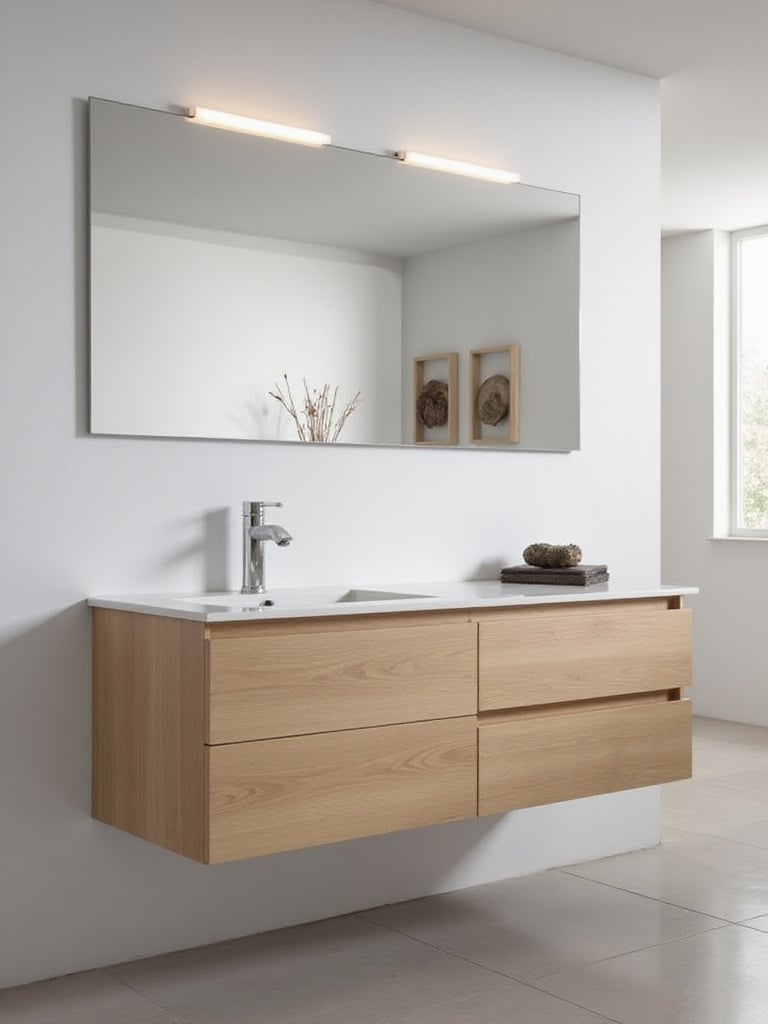
But let’s elevate it. Forget the rickety, framed sliders of the past. Today’s frameless and semi-frameless sliding systems are engineered to be incredibly smooth and visually light. They offer the space-saving functionality you need without sacrificing the clean, modern aesthetic you want.
To take that sense of openness to its peak, the frameless glass shower enclosure is non-negotiable. By removing the bulky metal framework, you create a nearly invisible barrier. Light flows freely, sightlines remain unbroken, and the bathroom feels instantly larger and more integrated.
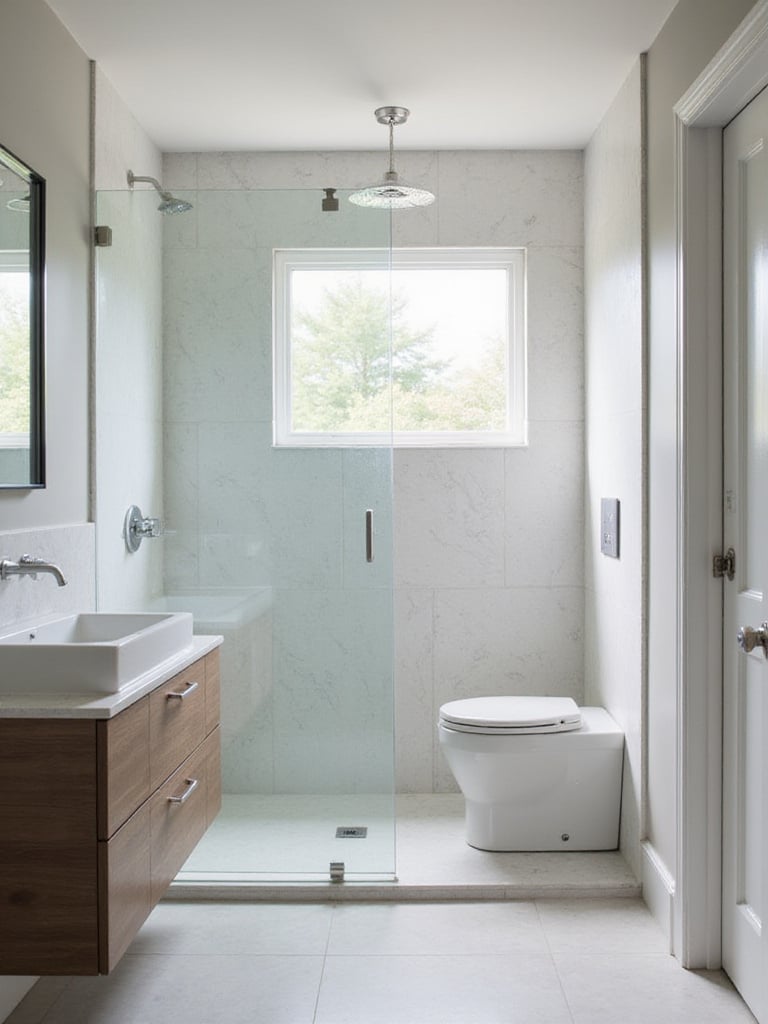
This is a place to invest in quality. Ask your fabricator for low-iron glass (often sold under brand names like Starphire). Standard tempered glass has a noticeable green tint, especially on the edges, which can muddy your color palette. Low-iron glass is exceptionally clear, allowing the true color of your beautiful tile work to shine through. It’s a detail that separates a good design from a truly exceptional one.
Once you’ve invested in a stunning, seamless glass shower, the last thing you want is a cheap plastic caddy or rusty metal rack hanging from the showerhead. It’s visual clutter that completely undermines the luxury aesthetic. The solution is the shower niche—a recessed shelf built directly into the wall.
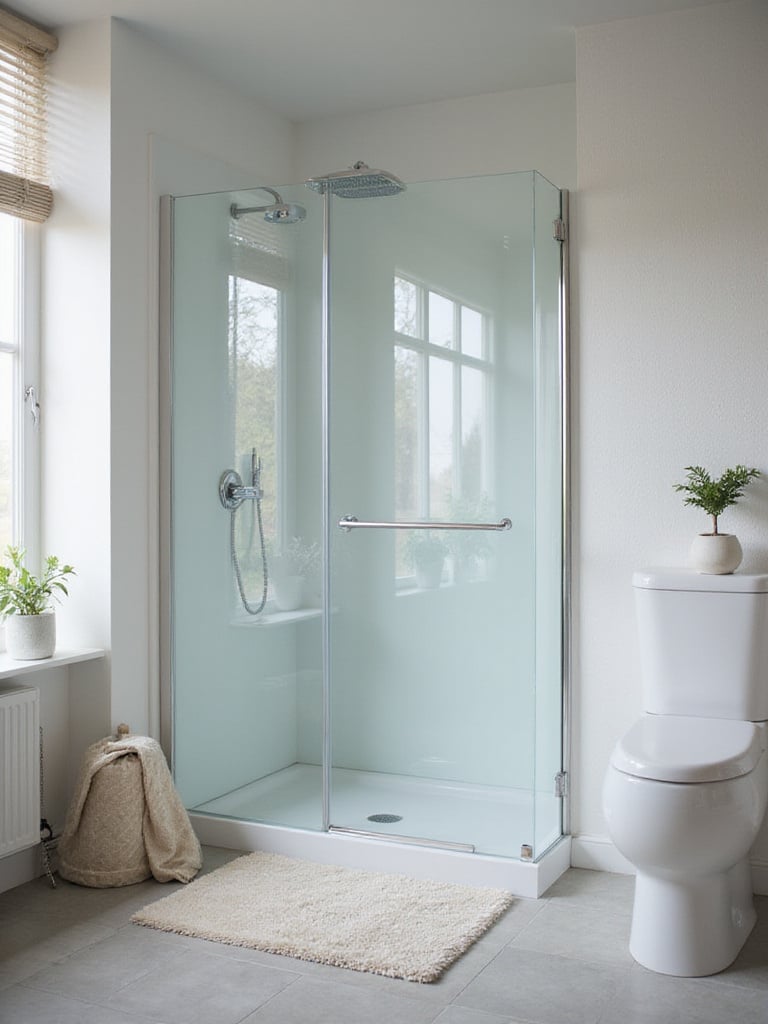
A niche provides a sleek, integrated home for your shampoos and soaps, keeping the shower space streamlined and open. It feels custom and intentional because it is. On a recent project, we tiled a tall, vertical niche with a contrasting mosaic tile and added a single, waterproof puck light. It transformed a simple storage feature into a stunning focal point, a little jewel box within the shower.
In a small room, floor space is gold. Don’t waste it on bulky, low storage. Instead, go vertical. A tall, slim storage unit, like a linen tower or an étagère, draws the eye upward, creating an illusion of higher ceilings and a more expansive space.
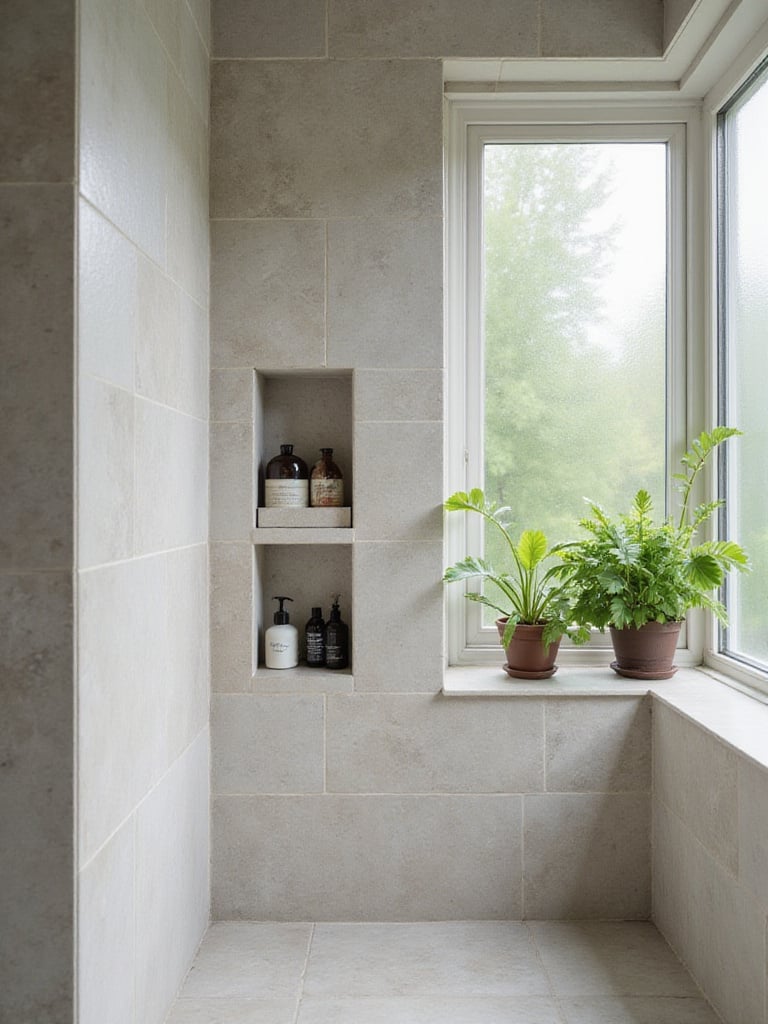
These units offer an incredible amount of storage on a minimal footprint. They provide a dedicated home for towels, toiletries, and supplies, allowing you to keep your countertops beautifully clear. Think of it as a skyscraper, not a strip mall—you’re building up, not out. This move leverages the one dimension that is almost always underutilized: height.
The space between the studs in your walls is pure, untapped potential. A recessed medicine cabinet is one of the most brilliant small-space solutions for this very reason. Unlike a surface-mounted cabinet that juts out into the room, a recessed version sits flush with the wall, maintaining a clean, uninterrupted plane.
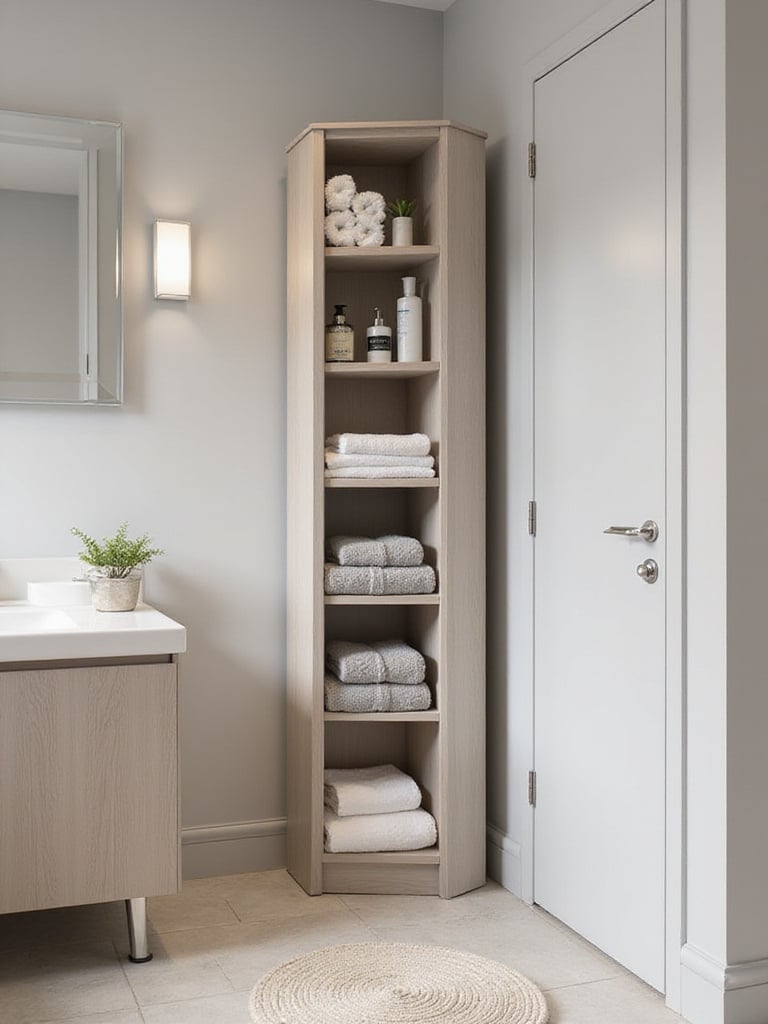
You reclaim 4-6 inches of depth that would otherwise be lost, which makes a significant difference over a vanity where you lean in daily. And, of course, the mirrored front serves a dual purpose. It’s your grooming mirror, yes, but it’s also a tool for bouncing light around the room and enhancing the feeling of spaciousness.
The cavern under the sink is often a chaotic jumble of cleaning bottles and half-used products. Taming this space is key to maintaining a serene, uncluttered countertop. Just as a well-organized kitchen makes cooking a joy, a well-organized vanity makes your morning routine effortless.
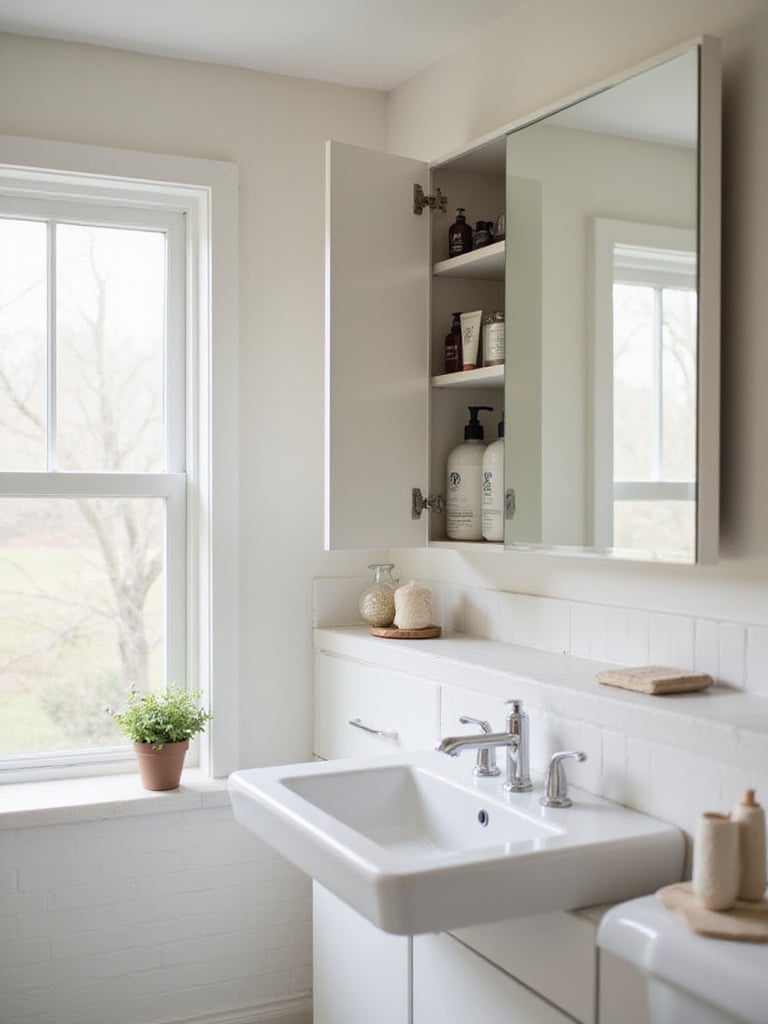
Don’t just throw things in a bin. Invest in smart organizing solutions. Stackable clear drawers, tiered shelves designed to fit around plumbing, and pull-out caddies can transform that dark abyss into a model of efficiency. I’m a fan of systems from brands like Rev-A-Shelf, which bring a level of high-end kitchen cabinet functionality to the bathroom. By giving every item a designated home, you eliminate the frantic search and the inevitable countertop pile-up.
Wall space is a precious commodity. Don’t waste it on a simple towel bar if you don’t have to. The back of the bathroom door is the most underutilized surface in the entire room. Installing a multi-tier towel bar here is a masterstroke of efficiency.
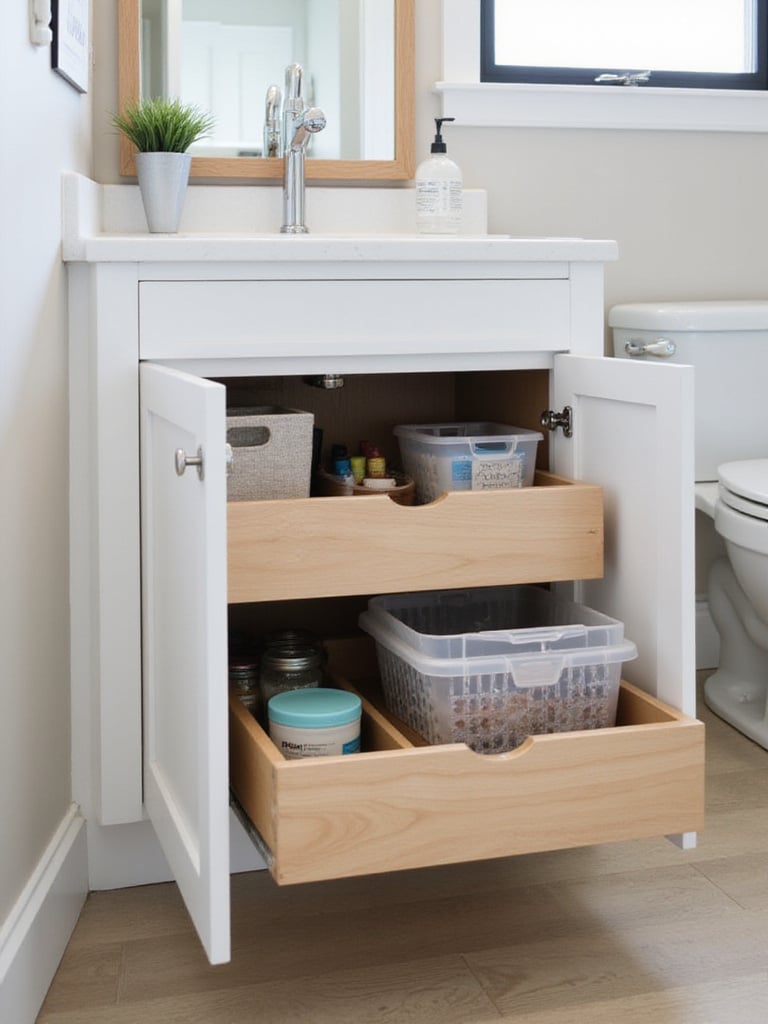
This one simple move can hold multiple bath towels, keeping them off the floor and promoting better air circulation for faster drying, all while freeing up prime wall real estate for something more beautiful—like a piece of art or a statement sconce. Choose high-quality hardware in a finish that matches your other fixtures to ensure this practical solution still feels integrated and luxurious.
If you want to infuse a true dose of five-star hotel luxury into your bathroom, this is it. A wall-mounted heated towel rail is the ultimate indulgence. It’s not just about the hedonistic pleasure of wrapping yourself in a warm towel on a chilly morning, though that alone is worth it. It’s also incredibly practical.
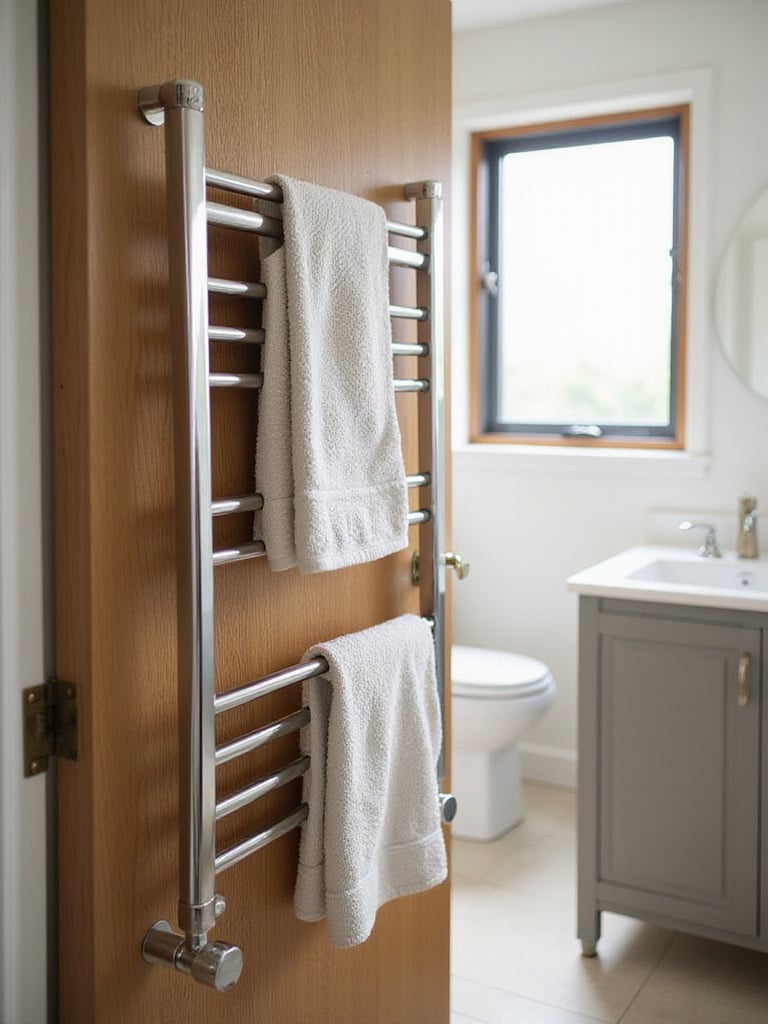
A heated rail dries towels significantly faster, which inhibits the growth of mildew and eliminates that persistent damp-towel smell. In a small, often poorly ventilated bathroom, this is a huge benefit for hygiene. Plus, it acts as a gentle, radiant heater, taking the chill out of the air. It’s a multi-functional piece that adds comfort, improves hygiene, and feels utterly decadent.
Open shelving can be a double-edged sword in a small space. Done wrong, it’s a magnet for clutter. Done right, it adds an airy, gallery-like feel that traditional cabinetry cannot match. The key is to think of it as a display space, not just a storage dump.
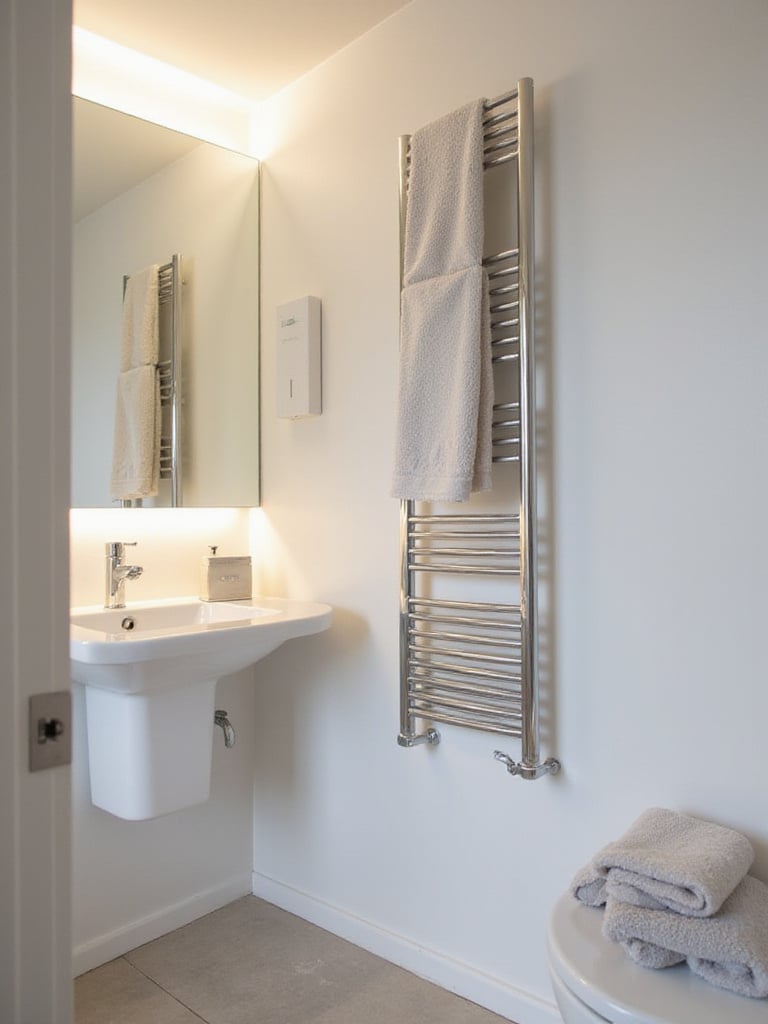
Use open shelves for your most beautiful items: a collection of perfume bottles, neatly rolled white hand towels, a small piece of coral, a vase with a single stem. Decant things like cotton balls and bath salts into beautiful glass jars.
“Open shelving forces you to be disciplined. It’s a commitment to minimalism. You must curate it like an exhibition, showcasing only what is both useful and beautiful. This single practice will elevate the entire room.”
This approach eliminates the visual bulk of cabinet doors and allows you to inject personality and style without taking up any floor space.
It’s the oldest trick in the book for a reason: light, neutral colors make a space feel larger. But this doesn’t mean your bathroom has to be a sterile white box. Think of creating a serene, tonal envelope. Soft grays, warm off-whites, and even muted, earthy beiges can create an expansive feeling by reflecting light and blurring the hard boundaries of corners.
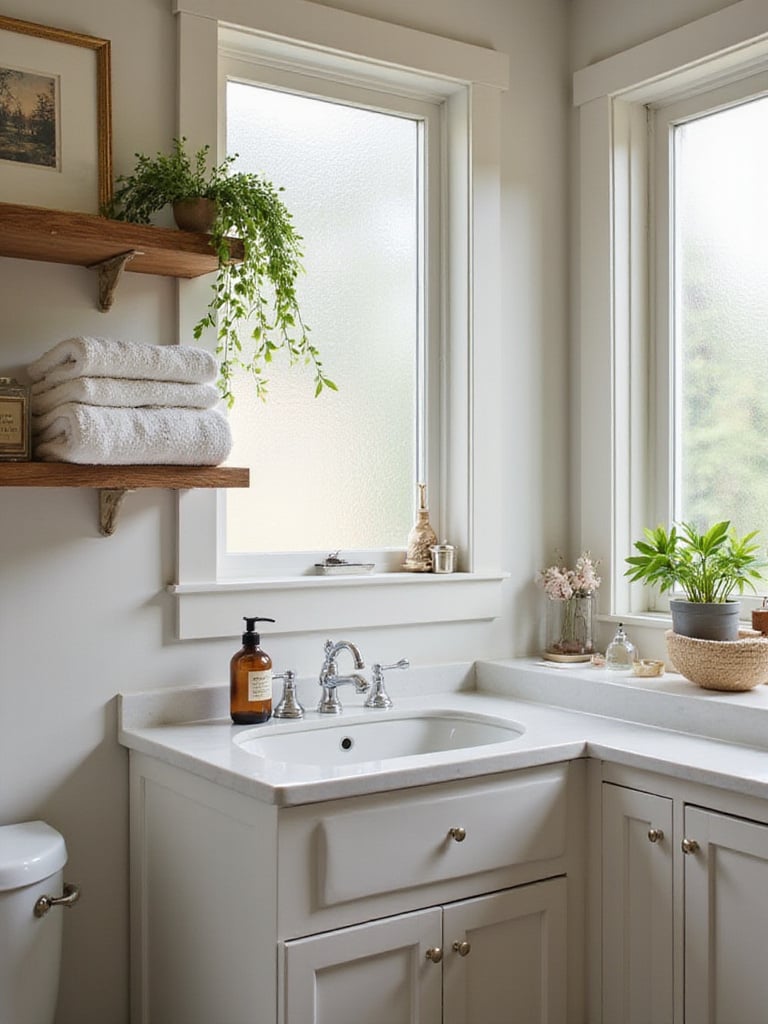
The real sophistication comes from layering textures within that quiet palette. Imagine a wall in a velvety, matte-finish paint, a floor of glossy Porcelain Tile, a vanity of smooth, honed marble, and the nubby texture of linen towels. This textural variety adds depth and interest, preventing the space from feeling flat while maintaining that crucial airy, light-filled atmosphere.
Here’s a counterintuitive truth: small rooms do not want small tiles. A busy grid of grout lines chops up the space and makes it feel smaller and more hectic. For a truly expansive, luxurious feel, go with large-format tiles—at least 12×24 inches, and even larger if you dare.
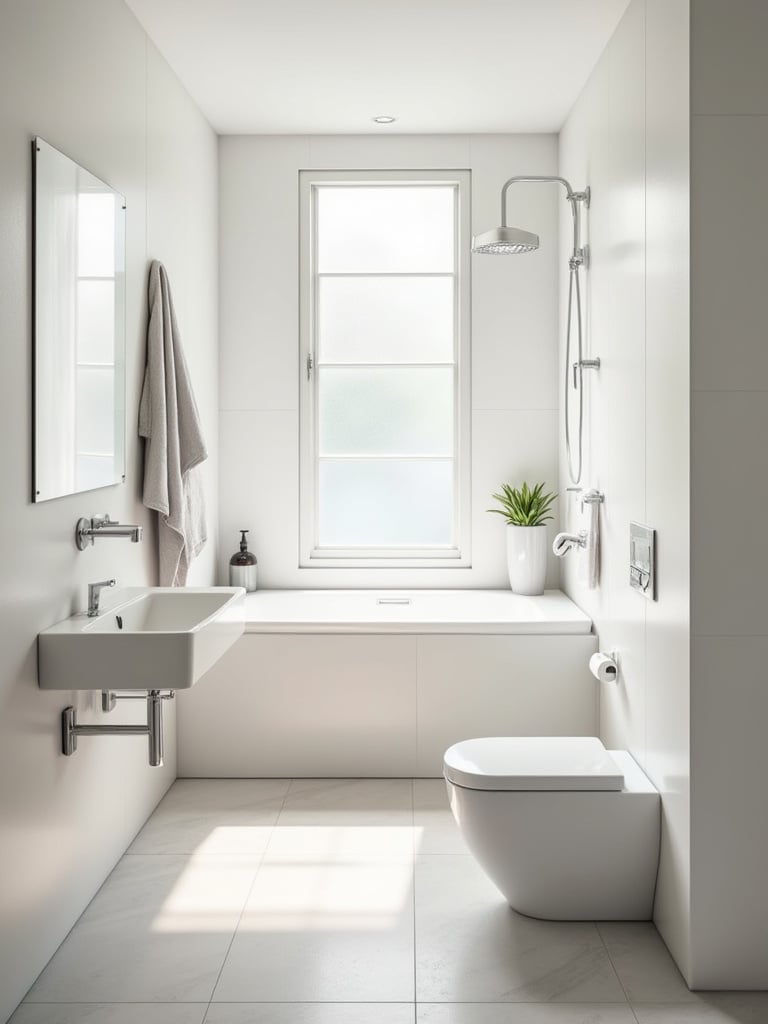
With fewer grout lines, the floor and walls become more monolithic, uninterrupted surfaces. This visual continuity tricks the eye into seeing a grander, more seamless space. For the ultimate effect, use rectified tiles, which have perfectly straight edges, allowing for a tiny 1/16-inch grout line. Then, match the grout color as closely as possible to the tile. The goal is to make the grout disappear, creating a stunning, continuous plane of color and texture. I’ve run the same large-format tile from the floor right up the shower walls, and the result is always breathtaking—it makes a small room feel powerful and dramatic.
A mirror is the most powerful tool of illusion in a designer’s kit. Strategically placing a large mirror doesn’t just reflect your space; it visually doubles it. It bounces light into the darkest corners and creates a profound sense of depth.

Don’t just hang a small, framed mirror over the sink. Think bigger. Consider mirroring the entire wall behind the vanity, from the countertop to the ceiling. Or, place a large mirror on the wall opposite the window to capture and amplify every bit of natural light. This single move can have a more dramatic impact on the perceived size of your bathroom than any other.
A single, harsh overhead light is the death of ambiance. It casts unflattering shadows and makes a room feel flat and institutional. The key to luxury lighting, especially in a small space, is layering. You need at least three types of light working in concert.
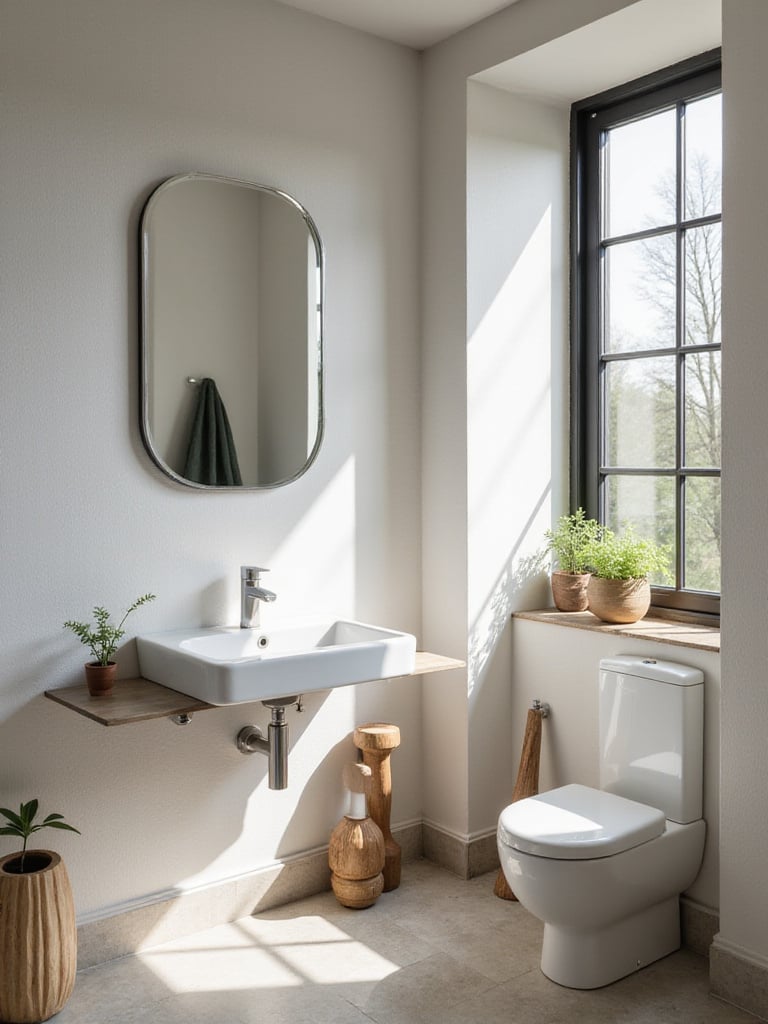
Start with your ambient layer: a central flush-mount or a few recessed cans that provide general, overall illumination. Next, and most importantly, is your task lighting. This is the light for grooming. Flank your vanity mirror with a pair of vertical sconces at eye level. This provides even, shadow-free light on your face. Finally, add an accent layer: a waterproof light in the shower niche, LED strips under the vanity, or a small spotlight on a piece of art. Each layer should be on a separate dimmer. This allows you to tailor the mood perfectly, from bright and functional for your morning routine to soft and serene for an evening soak. It’s the final polish that makes the entire design sing.
A single, harsh overhead light is the death of ambiance. It’s an interrogation lamp, casting unflattering shadows on your face and making even the most beautiful space feel flat and institutional. The key to luxury lighting, especially in a small space, is layering. You need at least three sources of light working in concert to create a space that is both functional and magical.
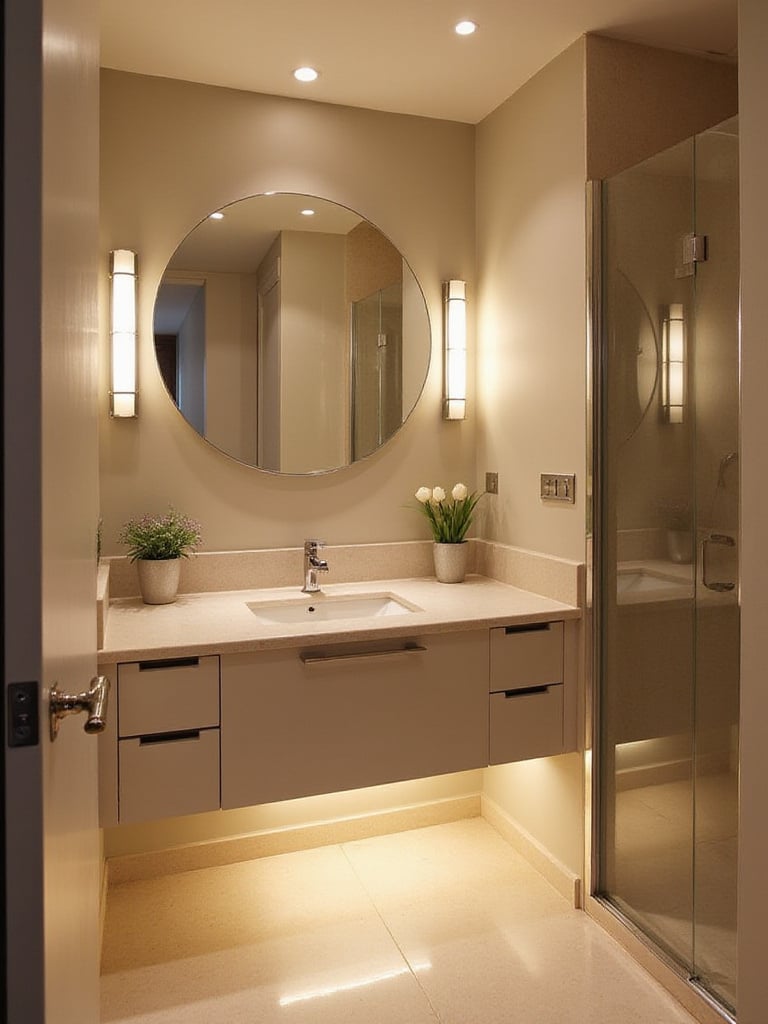
First is your ambient layer, the gentle, overall glow from recessed fixtures or a beautiful flush-mount light. This is your foundation. Next, and this is non-negotiable for true functionality, is your task lighting. Instead of a light bar above the mirror (which casts those dreaded shadows), flank the mirror with a pair of vertical sconces at eye level. This provides even, cross-illumination for flawless grooming. Finally, add the accent layer—this is the magic. It could be a soft wash of light down a tiled wall, the ethereal glow from beneath a floating vanity, or a tiny, waterproof light inside your shower niche. I’ve seen the smallest powder rooms completely transformed by this approach, going from claustrophobic to dramatic and inviting.
Each of these layers must be on its own dimmer. This is crucial. It gives you complete control to craft the perfect mood, whether it’s bright and energizing for your morning routine or soft and spa-like for a relaxing evening soak. This is the final polish that makes a design truly sing.
Transforming a compact bathroom into a personal sanctuary has little to do with its dimensions and everything to do with the intelligence of its design. As you’ve seen, it’s a series of thoughtful choices—fixtures that float, glass that disappears, light that flatters, and storage that’s both smart and seamless.
The best hotel bathrooms feel luxurious not because they are enormous, but because every single element has been considered. Every item has a purpose and a place. There is a sense of order and calm that is deeply restorative. This is what’s possible for you. Your dream bathroom isn’t hiding behind a wall you need to demolish; it’s waiting to be revealed through these principles of sophisticated, hospitality-inspired design.